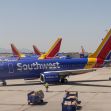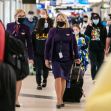As the busy summer vacation season approaches, prospects of air travel are once again worrisome. NBC News predicts “another season of flight disruptions.” AAA projects a 7% increase in travel over last year. CNN says, “This summer travel season could be one for the record books, especially at airports.” A headline in the Seattle Times warns, “Get ready for summer airport delays, industry experts say.” Axios says, “Brace Yourself for air travel hell.”
To make matters worse, in May, United Airlines pilots began “picketing for higher pay,” and Southwest Airlines’ pilots voted to strike. In April, the Federal Aviation Administration (FAA) announced it was asking airlines to cut back service in New York because it is facing a “severe shortage of qualified air traffic controllers.”
It is the rare traveler who has not been stranded at an airport, often missing planned holidays with loved ones who will carve their turkeys, jump into their favorite lake, or open their beautifully wrapped Christmas gifts without them. Air travel, which used to signal the start of precious holiday memories, now all too often, indicates the beginning of a nightmare.
The Biden administration, under the leadership of the Department of Transportation (DOT) and Secretary of Transportation Pete Buttigieg, hopes to do something about it. It can’t make planes show up on time, stop equipment failures, prevent bad weather, or settle strikes, but it has proposed rules that will compensate stranded travelers by requiring airlines to compensate and cover expenses for travel-related amenities, such as meals, hotels and rebooking.
On May 8, DOT announced a new rulemaking, two years in the making, which strives to “improve the passenger experience.” It would require the nation’s ten largest airlines to “guarantee” free rebooking on the same airline, as well as meals and hotel compensation. These improvements are part of what DOT has called its new Customer Service Dashboard, accessible at FlightRights.Gov.
The website is designed to increase “transparency.” It will detail which airlines currently offer monetary compensation or provide travel credits, vouchers or frequent flyer miles for flight cancellations or delays. DOT’s new rules would make these types of compensation mandatory when the airline is responsible for the flight disruption. Specifically, the new rules will require cash compensation, travel credits or vouchers, or frequent flyer miles when passengers must wait three hours or more for a new flight.
At a May 8 press conference, Buttigieg said, “When an airline causes a flight cancellation or delay, passengers should not foot the bill.” He said the new rule “would, for the first time in U.S. history, propose to require airlines to compensate passengers and cover related expenses. “
The DOT’s new rules signal a departure from current practices. At present, according to a DOT media release, only one airline guarantees compensation via frequent flyer miles, and two others give vouchers or travel credits. No airline currently guarantees cash compensation. “The Department’s rulemaking proposes to ensure that passengers experiencing controllable delays and cancellations are better protected from financial losses than is the case today.” The release promises that the new rule will also specifically “define controllable cancellation and delay.”
The Biden Administration’s DOT is not the only government office that is trying to upgrade passenger protections. Several members of Congress have been advocating better protections for passengers. The calls for action escalated after what Roll Call called Southwest Airlines’ “meltdown” last December that caused thousands of passengers to be stranded during the 2022 holiday travel season.
In March, the Senate Commerce Committee held a hearing at which chair Sen. Maria Cantwell (D-Wash) also called for the elimination of “junk fees,” such as increased charges for families who want to sit together. Cantwell also intends to mandate the inclusion of a Passenger Bill of Rights in the FAA’s next reauthorization bill.
Republicans on the Commerce Committee have been largely silent about these changes, but ranking member Ted Cruz (R-TX) has already warned against “regulatory overreach.” Airline for America, an industry trade organization, issued a statement that claimed: “The majority of flight cancellations have been due to circumstances outside of airlines’ control like weather conditions.”
Senators Richard Blumenthal (D-CT) and Edward J. Markley (D-Mass.) have introduced two bills to expand compensation as well. One bill would make airlines pay at least $1,350 to compensate for oversold flights and would immediately refund the cost of damaged or lost luggage. The other bill would stop “unreasonable high fees” for privileges that used to be free like checked bags, seat selection, and itinerary changes.
With COVID-19 in the rearview mirror, millions are looking forward to returning to the days when a plane ticket initiated wonderful times to come, rather than camping out in an airport and paying exorbitant prices for a sandwich or slice of pizza. Is it too much to hope that DOT’s new rules help will make the good old days of air travel return?






